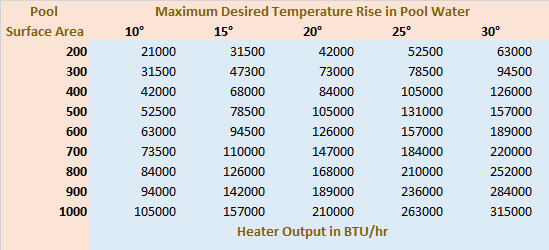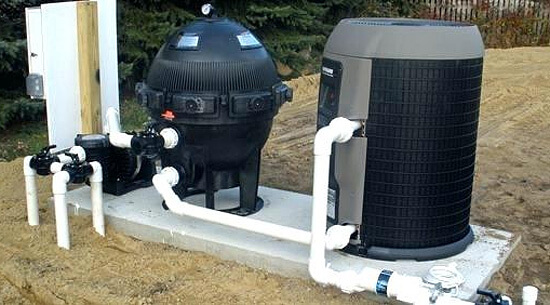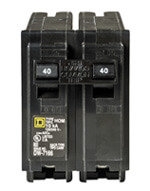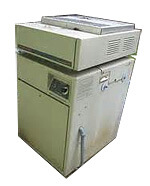FREE Standard Shipping On All Orders $100 or More!*
Convert from Gas Heat to Heat Pump
 Swimming pool heaters come in three flavors, gas, solar or electric. Each has its own advantages and disadvantages, and given your location, and accessibility, one or more of these pool heating options will work better than the others.
Swimming pool heaters come in three flavors, gas, solar or electric. Each has its own advantages and disadvantages, and given your location, and accessibility, one or more of these pool heating options will work better than the others.
Gas pool heaters work for any pool, anywhere, anytime - but are the most expensive and least efficient heater to operate.
Solar pool heaters work anywhere there is strong sun exposure, but lose effectiveness spring and fall, or during rain, or at night.
Electric pool heat pumps pull heat out of the surrounding air, and as such, only work when outside air temps are 60 F, or higher.
Let's assume, because of the title of this blog post - that you are exploring the replacement of a gas heater with a new pool heat pump. How does one go about doing this? Let's start with a new heater from our large selection of pool heat pumps.
Sizing a Pool Heat Pump
Due to the high cost of pool heat pumps ($2K - $4K), it is altogether tempting to try to buy a smaller model, to save a few bucks up front. That heat pump will run over-time, uses more energy, costs more to run, and may not reach a desired water temp.
Heat pumps are sized according to the BTU output, and this is often referenced in the model number, or certainly in the product specs. Pool heat pumps range from 50,000 BTU's to 166,000 BTUs, and we have sizes from 50K, 70K, 95K, 110K, 140K or 166K.
As you can see by the chart, larger pools require larger heaters, but it also depends in large part on HOW HOT do you want the water to be? Water temperature in the pool will generally be close to the ambient air temperature, so the real question is - "How many degrees above the average air temperature, do you want the water to be?" Or another way to ask is, "During the coldest shoulder months, how much heat do you want to add to the water, 10 degrees? 20 degrees? More?"

If you just want to add a few degrees during June, July and August - a 10 degree temperature rise may suit you well. If you want to open the pool a month earlier, and close a month later and enjoy swimming too, a heater with a 15-20 degree temperature rise is best. And if you want to swim in 85 degree water when the average daily temperature is only 55 degree, you'll need a heater size that can deliver a 30 degree temperature rise.
Heat pumps operate best in the 10 to 15 degree temperature rise range, and can add 20 Deg F with sunny air temps of 65 degrees or higher. Need more heat? Install more than one heat pump, yes!
Also consider if you want to also cool the pool in the summer. For most locations in the US, the pool gets uncomfortably warm, but only for a few days or weeks each summer. For pools in hot zones however, you may want to consider a H/C chiller, which can reverse the heating operation to pull heat out of the water and discharge it to the air, becoming a pool cooler.
Pool Heat Pump Placement
The first thing to know about pool heat pumps is that they can be extra heavy, weighing from 150 lbs to over 300 lbs, and they are also wide and cumbersome. Since a Truckline service is going to provide curbside service, you will need to devise a plan to move the heat pump around the house, over rough terrain and soft soils, to its new home.
Secondly, pool heat pumps may be wider or deeper in dimension, as compared to a gas heater, especially larger Raypak Classic Heat Pump models. If necessary you may need to consider the width of fence gates, or the size of the existing concrete pad to place the heater. If there is no existing pad, you can build one out of concrete and steel, or timbers and gravel, or buy a sturdy HVAC unit appliance base.
Pool Heat Pump Plumbing
Plumbing a pool heat pump is simply a matter of connecting your PVC return pipe to the "In" and "Out" unions on the front of the heater. However, your gas heater pipe connections are a foot or two off the ground, and most heat pump connections are at ground level. To complicate matters further, you may also have to connect a salt system, mineral purifier or pool chlorinator.

As with any pool plumbing modification, the best thing is to make a plan, drawn out on paper, so you can visualize and count-up, all the various pool plumbing fittings and connectors needed. The fewer turns and twists, the better! Keep your plumbing lines simple and clean, and remember to measure twice and cut once!
The gas pipe on your gas pool heater should be shut-off at the gas meter, and locked, in addition to being capped off tightly at the heater.
Pool Heat Pump Wiring

This is where you should probably call in a local electrician, unless you already have a 40-50 amp breaker on your pool equipment sub panel box. Pool heat pumps need a high amount of amps to pass through, although they cost no more to run than air conditioners. In addition to connecting the wires to the breaker panel, you will also need to connect the pool bonding wire to the bonding lug on the heat pump cabinet. This is the bare #8 copper wire that 'should be' connected to your current heater, pump and filter.
Disposing of the Old Gas Heater

To make lugging the old heater easier, you can remove the lower burner tray and the upper heat exchanger, and lug each piece separately. The copper heat exchanger does have some scrap metal value, if you have a scrap metal yard nearby. Same goes for brass headers, if your heater has them (most are cast iron or thermoplastic). Otherwise, the entire heater can be recycled at a landfill that accepts scrap metal and plastics. Or, post your old heater on Craigslist.com, listed as a Free non-working pool heater and set it out on the curb. Someone will likely come by, load it up, and drive off!
Pool Heat Pump Buyer's Guide
We currently sell 4 different brands of inground heat pumps and here's a few examples.
Aqua Cal - Is one of the oldest and largest manufacturers of heat pumps. Aqua Cal does not make any other products besides heat pumps for pools in both residential and commercial applications. Their heat exchanger is titanium. Aqua Cal has an easy to read digital display, dual thermostat and whisper quiet fan motor. The thermostat has a lockout option which will prevent anyone from adjusting the pool temperature.

Aqua Pro - the AquaPro heat pump has a titanium heat exchanger with a 5 yr. warranty on the heat exchanger. Most of the units have a digital display with a dual thermostat. The housing on the heat pump is very durable and is weather resistant. Aqua Pro is one of the leaders in pool heat pumps, and one of the first manufacturers in Florida.
Get rid of your old gas pool heater and replace it with a clean energy pool heat pump. It's not for immediate heating, or heating during winter, but if you want to add and easy 10-20 degrees to the water, and enjoy a longer pool season - install a pool heat pump!